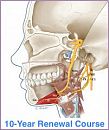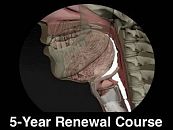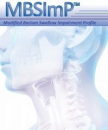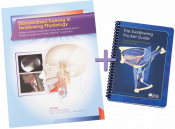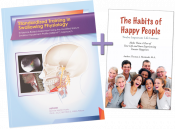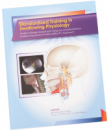Dysphagia: Integrating Respiration And Deglutition #e103
Presenter: Bonnie Martin-Harris, PhD, CCC-SLP, BCS-S, ASHA Honors
Learn the mechanistic, anatomical and functional relationships of the human upper aerodigestive tract.

– R.K., prior course participant
Read more comments about this course!
This course addresses the mechanistic, anatomical and functional relationships of the human upper aerodigestive tract. A line of research derived directly from the needs of patients will highlight the interactions of respiration and swallowing. The physiologic advantages and disadvantages of contiguous nervous, muscular and connective tissues common to the two functions will be illustrated and discussed.
The reciprocal roles of valves and pressure generating mechanisms common to voice and swallowing will be demonstrated. Normal and impairment models of respiratory-swallowing coordination will be reviewed as a foundation for the development of novel therapies that directly target respiratory-swallowing coordination during swallowing rehabilitation.
Course is offered for 0.1 ASHA CEUs – 1 Contact Hour.
Course Overview – Run Time: 1:18:31
- Mechanistic and functional cross-system interactions between respiration and deglutition.
- Physiologic advantages and disadvantages of the respiratory and vocal tract configuration on swallowing function.
- Normal model of respiratory-swallowing coordination and implications for development of novel dysphagia therapies.
- Destabilizing effects of respiratory-swallowing discoordination on airway protection and bolus clearance.
- Results of newly tested interventions that directly target cross system interactions of the upper aerodigestive tract.
– L.A., prior course participant
Read more comments about this course!
The content of this online CE course does not focus exclusively on any specific proprietary product or service. Presenter financial and non-financial disclosures may be found in the Presenter & Disclosures area.
Video PowerPoint presentation with author narration & downloadable handout. Stop and re-start the course at any point. Learners retain access to course content after completion for ongoing reference and review.
Reviews
"Beneficial tips re: the supraglottic swallow. I liked the images and videos to correlate with topics." M.R. (Jan. 2025)
"I liked the organization; the course was the appropriate length." A.C. (Sep. 2024)
"COPD, laryngectomee, impact on swallowing were all beneficial topics. I liked the incorporation of MBS images." L.G. (Sep. 2024)
"Discussing the need for coordination in breathing patterns and swallowing in the COPD population was beneficial. I enjoyed the information." B.P. (Aug. 2024)
"The section on COPD was beneficial. I love this platform." B.M. (May 2024)
"It was helpful to discuss COPD effects on maneuvers, structural positioning and effect on swallowing function, and interaction of systems rather than focus on phases. I liked the convenience and the ease of digesting material." O.B. (Mar. 2024)
"Beneficial discussion on the relationship between breathing and swallowing. I liked the explanation that swallowing is not in specific "phases." A.F. (Mar. 2024)
"Strategies to optimize the efficacy of maneuvers were beneficial. I liked the accessibility of the course." A.A. (Mar. 2024)
"All of this course was beneficial, and I liked the visuals." M.L. (Feb. 2024)
"How to retrain breath-swallow patterns to promote more effective laryngeal vestibule closure was beneficial. I liked the examples provided." M.S. (Dec. 2023)
"The information related to COPD is very beneficial in the SNF population. The presentation and diagrams were easy to follow and understand." S.F. (Nov. 2023)
"The Dysphagia problem profile for COPD patients was helpful. I liked the supporting references/videos." V.O. (Nov. 2023)
"Very detailed and pertinent information on A&P. I liked the content and delivery with examples from research." S.C. (Oct. 2023)
"Relationships of breath-swallowing coordination, description of impact on persons with COPD, and suggestions for application to therapy exercises were beneficial topics. I liked the videos that accompanied both research data and functional descriptions of both normal and abnormal swallowing actions." J.H. (Aug. 2023)
"Excellent visual imagery. Discussion about the most beneficial instructions for the patient to initiate swallow was helpful." A.S. (Jun. 2023)
"Good explanation of the normal swallow. The sequence common in swallowing by a patient with COPD was beneficial." H.K. (May 2023)
"Description of the phases of respiration and different patterns of coordination between respiration and deglutition, the impact of the different phases of respiration on the position of the larynx for deglutition, and description of the impact of certain diseases on breathing and swallowing were all beneficial." A.P. (Mar. 2023)
"Learning differences in breathing patterns for those with restrictive lung diseases. I liked the presentation style and flow." L.M. (Feb. 2023)
"Dysphagia in patients with COPD, coordination of swallowing and breathing (in healthy population), and videofluoroscopic analysis of swallowing physiology." A.M. (Feb. 2023)
"I liked the research describing the optimal and sub-optimal breathing patterns surrounding swallowing for different patient populations. Good videos and explanations." L.A. (Dec. 2022)
"Learning to teach breath and swallow coordination to patients with respiratory issues to achieve optimal swallowing. I liked the modified barium swallowing study videos that the presenter showed." C.G. (Nov. 2022)
"Relation of respiratory phase and swallowing. Good use of swallowing imaging." J.R. (Nov. 2022)
"I liked the real photos and the videos used during presentation." K.D. (Oct. 2022)
"Practical clinical implications. Excellent presentation, well organized and focused. Review of respiratory swallowing coordination and functions, swallow patterns, COPD, physiological swallowing impairments, comparison with normal aging implications for treatment and modification of swallow maneuver training." M.E. (Oct. 2022)
"Learning how swallow-breathing discoordination impacts our patients with COPD. I liked that I can complete course at my own pace, rewind and listen again." V.F. (Sep. 2022)
"The teaching on optimal breathing pattern for improved breath/swallow coordination was helpful." N.M. (Sep. 2022)
"Functional information. I liked the discussion on COPD." C.L. (Aug. 2022)
"I liked the treatment strategies and ease of use of the course." L.H. (Jul. 2022)
"I liked the anatomy/physiology overview, detailed description of respiration cycle, and how it relates to the swallowing mechanism." L.H. (Jul. 2022)
"I liked learning the physiologic components of deglutition. Video studies were helpful." L.H. (Jul. 2022)
"Discussion of normal breathing pattern was helpful. I liked learning the relationship between respiration and swallowing based on the latest research evidence." H.H. (Jun. 2022)
"Related to esophageal symptoms - sticking sensation with COPD patients. Videos and animations were helpful." S.T. (Jun. 2022)
"Learning clinical features seen in patients with respiratory problems during swallowing. Learning all the physiological impairments associated with respiratory probs & COPD. Use of swallow respiratory phase / pattern training." L.H. (May 2022)
"I liked the use of MBS studies to reinforce messages and instructions for supraglottic swallow technique." L.H. (May 2022)
"I liked all of the radiographic imaging to demonstrate and support the lecture information. Very conducive to learning!" M.D. (Feb. 2022)
"I liked the practical applications with head and neck cancer patients as well as COPD." A.G. (Jan. 2022)
"The explanation behind each anatomical finding associated with the physiological and pathological consequences was especially useful. It was highly structured with many useful videos." P.T. (Jan. 2022)
Course Objectives
- Identify the mechanistic and functional cross-system interactions between respiration and deglutition.
- List the physiologic advantages and disadvantages of the respiratory and vocal tract configuration on swallowing function.
- Describe the normal model of respiratory-swallowing coordination and implications for development of novel dysphagia therapies.
- Recognize the destabilizing effects of respiratory-swallowing discoordination on airway protection and bolus clearance.
- Reference the results of newly tested interventions that directly target cross system interactions of the upper aerodigestive tract.
Presenter & Disclosures

Bonnie Martin-Harris, PhD, CCC-SLP, BCS-S, ASHA Honors, is the Alice Gabrielle Twight Professor in the Roxelyn and Richard Pepper Department of Communication Sciences and Disorders, and Associate Dean for Academic Affairs in the School of Communication at Northwestern University. She is also Professor, Otolaryngology-Head and Neck Surgery and Radiation Oncology, Feinberg School of Medicine.
She is a Past-President of the Dysphagia Research Society, past Chair of the Specialty Board for Board Certification in Swallowing and Swallowing Disorders (BCS-S), and Associate Editor for the Dysphagia Journal. She is an ASHA Fellow, recipient of the 2016 Admiral Albert J. Baciocco Innovation Award – Medical University of South Carolina (MUSC), The 2017 12th Annual Pepper Lecturer, Northwestern School of Communication, Honorary Member of the MUSC Chapter of The National Academy of Inventors, recipient of Honors from the South Carolina Speech-Language-Hearing Association (SCSHA), 2010 MUSC College of Health Professions Scholar of the Year Award, and associate member of the Academy of Otolaryngology-Head and Neck Surgery and the American Head and Neck Society.
Dr. Martin-Harris is the author and developer of the first standardized method for videofluoroscopic assessment of swallowing impairment (Modified Barium Swallowing Impairment Profile, MBSImP™), translated to research and clinical practice in the United States, Canada, and 13 additional countries. She is also the author of the manual, "Standardized Training In Swallowing Physiology—Evidence-Based Assessment Using The MBSImP Approach" published by Northern Speech Services. Her work is funded by the National Institutes on Deafness and Other Communication Disorders (NIDCD), the Veteran's Administration, and the Mark and Evelyn Trammell Foundation.
Presenter Disclosures:
Financial — Bonnie Martin-Harris is presenter of online CE courses sponsored by Northern Speech Services; receives royalties.
Financial — Bonnie Martin-Harris is the author of "Standardized Training In Swallowing Physiology — Evidence-Based Assessment Using The MBSImP Approach" published by Northern Speech Services; receives royalties.
Financial — Bonnie Martin-Harris' former employer, MUSC, receives royalties from Northern Speech related to enrollment tuition of the MBSImP Online Training.
Financial — Bonnie Martin-Harris' MBSImP research and development was funded in part by Bracco Diagnostics; received grant funding.
Financial — Bonnie Martin-Harris' research is funded in part by the Veteran's Administration (VA); receives grant and research funding.
Financial — Bonnie Martin-Harris' research is funded in part by the Mark and Evelyn Trammell Foundation; receives grant funding.
Financial — Bonnie Martin-Harris' research is funded in part by the National Institutes on Deafness and Other Communication Disorders (NIH/NIDCD); receives grant and research funding.
Nonfinancial — Bonnie Martin-Harris is associated with numerous journals, publications, and boards related to speech-language pathology; receives no compensation in these roles.
Intended Audience / Accreditation

This program is offered for 0.1 ASHA CEUs (Intermediate Level; Professional Area).

Intended Audience
- Speech-Language Pathologists
ASHA CEUs: NSS online courses are registered with ASHA and are offered for ASHA CEUs. The number of ASHA CEUs is noted above. Note that 0.1 ASHA CEU = 1 contact hour = equals 1 CEE.
ASHA CE Registry: During the enrollment process, if you select to receive ASHA credit for this course and if you provide your ASHA number, NSS will automatically submit your CEU information to the ASHA CE Registry after successful course completion (80% on post test). This submission happens once per month, during the first week of the month. For example, if you complete your course on November 7th, NSS will submit all November online course CEUs to ASHA during the first week of December. When ASHA inputs the information into their database, they will mark the course as completed on the last day of the month in which it was completed, so November 30th using this example. The certificate of completion available for you to print immediately, however, will reflect the actual completion date, November 7th in this example. Due to ASHA processing procedures please allow 2-3 weeks, from the submission date, for the course to appear on your ASHA transcript.
ASHA CEUs: Attendees must meet at least one of the following conditions in order to be eligible to earn ASHA CEUs:
- Current ASHA Member
- ASHA Certificate of Clinical Competence (CCC) Holder
- Licensed by a state or provincial regulatory agency to practice speech-language pathology (SLP) or audiology
- Credentialed by a state regulatory agency to practice SLP or audiology
- Credentialed by a national regulatory agency to practice SLP or audiology
- Engaged in a Clinical Fellowship under the supervision of an individual with their ASHA CCC
- Currently enrolled in a master's or doctoral program in SLP or audiology
If an attendee is not an ASHA member or CCC holder but meets any of the above criteria, they may inform the ASHA CE Registry of their eligibility by visiting this site.
Licensing Boards: Most state licensing boards DO accept CEUs earned online (usually classified as home-study credits). Some state boards do, however, place a limit to the number of credits that can be earned via home study/online courses. For the most current information, we suggest that you contact your licensing board or agency to verify acceptance policies and/or any credit limits related to home-study courses prior to registering for this course.
Additional accrediting agencies by which Northern Speech is an approved CE provider:
- California: NSS is approved as a provider of continuing education by the California Speech-Language Pathology & Audiology Board. Provider #PDP4. Online CEU limits may apply; please contact SLPAHADB for current online CEU acceptance policies.
- Iowa: NSS is approved as a provider of continuing education by the Iowa Board of Speech Pathology and Audiology Examiners. Provider #169.
- Kansas: NSS is approved as a provider of continuing education by the Kansas Department of Health and Environment. Provider #LTS-S0005.
Frequently Asked Questions
Customer Support: Please phone 888.337.3866 or email info@northernspeech.com.
Course Completion Timeframe:
You have unlimited time to complete our online courses. You may log off and log on as often as you’d like to in order to complete all sections of a course.
However, completion dates are based on Eastern Standard Time. Therefore, if you need your CEUs by a certain date, be sure to complete the course test before 11:59pm EST on that date. For example, if you need CEUs before January 1st, you will need to complete the course test before 11:59pm EST on December 31st.
Content Access:
Access to course materials and content does not expire, even after completing the post test. You may continue to review course material by logging into your NSS account, clicking the My Online Courses tab, and then viewing your desired course.
Certificate of Completion:
On successful completion of the post test (80%), a certificate will be immediately available for download and/or printing. This certificate will include your name, date of completion (based on Eastern Time Zone, USA/Canada), and number of contact hours (CEUs / CEEs). Please note that CEUs are awarded on the date of successful test completion, not the date of course enrollment. Please ensure that you successfully complete the post test prior to any licensure renewal dates.
ASHA CE Registry Submission:
During the enrollment process, if you select to receive ASHA credit for this course and if you provide your ASHA number, NSS will automatically submit your CEU information to the ASHA CE Registry after successful course completion (80% on post test). This submission happens once per month, during the first week of the month. For example, if you complete your course on November 7th, NSS will submit all November online course CEUs to ASHA during the first week of December. When ASHA inputs the information into their database, they will mark the course as completed on the last day of the month in which it was completed, so November 30th using this example. The certificate of completion available for you to print immediately, however, will reflect the actual completion date, November 7th in this example. Due to ASHA processing procedures please allow 2-3 weeks, from the submission date, for the course to appear on your ASHA transcript.
Purchase Orders:
Purchase orders are currently not accepted for online orders, if you wish to submit a purchase order please do so at info@northernspeech.com or fax to 888-696-9655.
What is an Online Course?
Our Online Courses consist of video, audio, and/or text content and are offered for ASHA CEUs. Unlike a webinar, which requires participants to be logged on and at a computer at specific times, our Online Courses are available to you at any time, from any device, via your NorthernSpeech.com online account. You may work at your own pace and start and stop your course as you wish. Your course will conclude with a short post test. On successful completion of the post test (>80%), a printable certificate of completion is presented to you.
Receiving CEUs:
Northern Speech is an ASHA CE Provider and our online courses are registered with ASHA and offered for ASHA CEUs. Please note that successful completion of the online post test is required prior to the awarding of CEUs. Please contact your state licensing board for acceptance policies related to CEUs earned online. Please note that courses offered for university students are not applicable for CEUs.
Registering for an online course:
You may browse all online courses by clicking the Continuing Education tab above, then Online Courses. Once you find a course, click Enroll Now, and you will be asked to either log into your existing Northern Speech account or create a new online account. Once you’ve entered your account information and provided your credit card payment, your course will be immediately available to you.
Accessing your purchased course or returning to a purchased course:
You will be able to access your online course by logging into your Northern Speech account and then clicking the My Online Courses tab on your profile screen. Click the course you would like to start or to resume. From there, proceed through the course sections until you are ready to complete the post test. You do not have to complete your course all at once. You may log on and off as you wish.
Testing requirements:
Each online course concludes with a post test consisting of multiple choice or true & false questions. Scores of 80% or greater are required for successful course completion and awarding of CEUs. You may revisit course materials and retest as needed to achieve a passing score.
Number of CEUs offered:
We offer courses from 1 to 21 contact hours. Each course will note the number of CEUs offered. Please note that 0.1 CEU = 1 contact hour = 1 CEE.
State licensing boards and online CEUs:
NSS is an ASHA CE Provider and most state licensing boards DO accept ASHA CEUs earned online (usually classified as home-study credits). Some boards do, however, place a limit to the number of CEUs that can be earned via home study/online courses. For the most current information, we suggest that you contact your licensing board or agency to verify acceptance policies and/or any CEU limits related to home-study courses prior to enrolling in an online course.
Course formats:
Our course formats include: text, audio, video, and PowerPoint with author narration. Each course will note the format on the course description page. Most courses include closed captioning.
Course handouts:
Most of our online courses provide a link to download the accompanying handout as a PDF file.
Group discounts:
Groups of 3 or more are eligible for a 20% discount on each registration on most of our online courses. To receive this discount, registrations need to be processed together via the "Group Rates" tab on the Online Course of your choice.
Computer requirements:
For our online courses to function best, we recommend that you update your computer to include the newest version of your Internet browser (Safari, Chrome, Firefox, Edge, Internet Explorer, etc.) and newest version of your computer's operating system. Also a high-speed Internet connection is recommended (cable or DSL). Speakers or headphones will be required for many of our courses as many contain audio components.
Course Cancellation Policy:
A purchased online course can be exchanged, refunded, or transferred to another individual if contact is made with NSS (via phone or email) within 30 days of purchase and the course materials have not been viewed or downloaded.
Special Needs:
Please click here for any special needs requests, and we will do our best to accommodate them.
| Contact Us |





